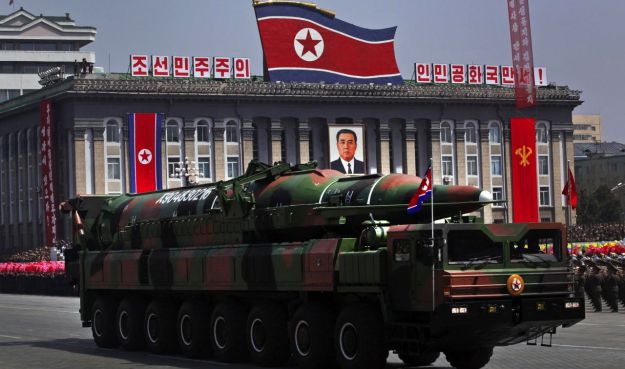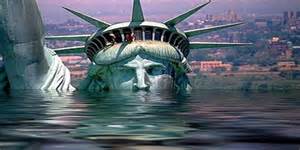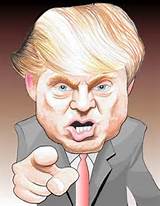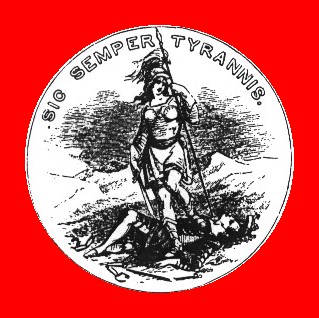
On April 28, Secretary of State Rex Tillerson told the U.N. that North Korea “must dismantle its nuclear missile programs” before the US “can even consider talks.”*
Sounds reasonable.
Why hasn’t the Kim Jong-Un regime responded with open arms and shouts of joy for this generous and fair-minded proposal from Uncle Sam?
Maybe it is because North Korea not only has first-hand knowledge of US “diplomacy,” but it can point to the grisly consequences that happen to regimes that do not have nuclear capabilities when they fall out of favor with Washington war mongers. Serbia, Afghanistan, Iraq, Libya, Syria are just some recent examples.
Nor does North Korea have to look around the globe for what the US does to nations without nuclear arsenals, but can recall events which took place not so far away. For more than a decade, America mercilessly pulverized the little, defenseless country of Vietnam. Despite the destruction and mass murder inflicted, it was to no avail except, of course, to line the pockets of arms manufactures while American citizens were drained of their wealth and blood.
Or simply, Kim Jong-Un can look at his nation’s own history and see how the US treated it prior to it becoming nuclear. In the “police action” of 1950-53, American coalition forces killed over 3 million North Koreans and dropped more bombs on the country then were used on Japan in World War II according to international war crimes lawyer Christopher Black.**
And, why would North Korea or, for that matter, anyone else have any faith in diplomatic agreements with the US which consistently violates terms of international accords and often complains afterwards when agreements are reached. The latest example is President Trump carping that Iran is not living up to the “spirit” of the nuclear deal concluded under the Obummer Administration and signed off on by six major world powers.
North Korea, as well as the rest of the world, which is not bribed or threatened by the US Deep State, is certainly aware that the two American-Iraqi Wars had their origins due to American duplicity. While it originally gave Saddam Hussein permission to intervene in Kuwait, the US then reneged blaming the Iraqi strongman which thus laid the groundwork for his murder and the country’s destruction.
Not only can North Korea look to the murderous and duplicitous US foreign policy record, but it can point to how the American state has killed its own citizens from its involvement in the take down of the World Trade Center, to the gassing and slaughter of men, women and children at Waco, Texas. Moreover, the federal government and now local authorities are terrorizing their citizens with increasing regularity via a number of false flag events and drills.
By all means, the Kim Jong-Un regime should come to its senses and acquiesce to US demands.
Unfortunately, because it is an authoritarian society based on the immoral and economically unworkable system of communism, North Korea is unable to make an ethical case against the hypocrisy of the US which accuses Syria and others of human rights violations, yet has allowed the slaughter of innocent babies of some 40 million since the legalization of abortion in 1973. Moreover, in another societal-wrecking and depraved act, the US Supreme Court has sanctioned sodomy, one of the four sins that cry to heaven for vengeance.
While no single entity can militarily challenge US hegemony, a reversal of the murderous ways of American foreign policy will only come about through a change in ideology on the home front. Once the justification for empire is debunked in the court of public opinion, the mobilization of anti-war/anti-empire movement can commence.
After generations have been inculcated by the media, public schools, colleges/universities and the government about the glories of the US military, it is unlikely that there will be any paradigm shift in American foreign policy matters anytime soon. Only an economic collapse or severe enough financial panic will force the US to pull back on its overseas adventurism.
In the meantime, if Kim Jong-Un intends to survive and keep his country from resembling Iraq or Syria, he should maintain his “unreasonable” stance when the likes of Rex Tillerson demand that North Korea disarm.
*Tyler Durden. “Trump Slams ‘Disrespectful’ North Korea After Unsuccessful Missile-Test, Warns Situation is ‘Bad.'” 28 April 2017. http://www.zerohedge.com/news/2017-04-28/north-korea-test-fires-another-ballistic-missile
**Christopher Black. “North Korea: The Grand Deception Revealed.” New Eastern Outlook. 3 March 2017. http://journal-neo.org/2017/03/13/north-korea-the-grand-deception-revealed/
Antonius Aquinas@AntoniusAquinas









